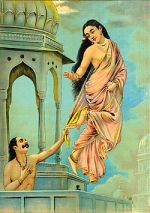The Hindu Mythology talks about three manifestations of the Almighty. Brahma – the Creator, Vishnu – the Preserver and Shiva – the Destroyer.
In the first place, it would appear that Creator and Preserver must be good and Destroyer must be bad. However, in India we worship the Preserver and the Destroyer but not the Creator. Confusing?
The confusion occurs because the notion of the world in our scriptures is very different and we are not much aware of it.
According to the scriptures, in the beginning only Narayan existed. From his navel emerged Brahma who was scared to be in a dark space. This feeling of insecurity generated fear in his mind and to materialize his significance he created the world. The world was, thus, not a result of divine grace but a result of Brahma’s desire. The world is thus considered Maya, or Illusion. It is this Illusion that Shiva ignores. He believes in the existence of soul and the power of tapasya so he rejects this materialistic world and thus metaphorically destroys it. Therefore he is called the Destroyer.
After he created the world, Brahma’s desire did not end but increased even more and he went to chase the Goddess Saraswati. She ran away from Brahma. She went to the East so Brahma emerged a head in the East. She went to the West so he propped a head in the West. She went behind him so he emerged a head at his back. She ran in the upward direction so he emerged a fifth head on the top.
Shiva got so disgusted by this utter display of desire by Brahma that he beheaded his fifth head. Thus the Destroyer destroyed the excessive desire of the one who created Maya. Therefore the Destroyer is worshipped and the Creator is not.
(Vishnu, the Preserver, recognizes that the world is an illusion and believes in the power of tapasya. But at the same time he understands the existence of Brahma’s desire and believes in preserving it as long as the desires are in limits. This concept of limited desire is called Dharma. A man who learns to control his desire and outgrow his fear walks on the path of Dharma. He who is overwhelmed by his fear and cannot control his desires steps on the path of Adharma. Vishnu creates this balance on Earth, therefore he is the Preserver. He watches it sportfully when Dharma is being followed and allows Brahma existence. When he sees Adharma overpowering Dharma, he takes an avatar and sets things right.)
To destroy, Shiva needs power therefore he is associated with the Goddess of power, Shakti. Throughout the epic Mahabharata, many characters worship Shiva to seek power in some form or the other. Amba worships Shiva to get a boon to kill Bheeshm. Arjuna worships Shiva during his exile to achieve deadly weapons to prepare for the Kurukshetra war. Jayadrath worships Shiva to obtain a boon of overpowering the four Pandavas (this is how he gets Abhimanyu killed).
It is also interesting to note that three people mentioned in the above example are obtaining power to avenge some kind of humiliation.




